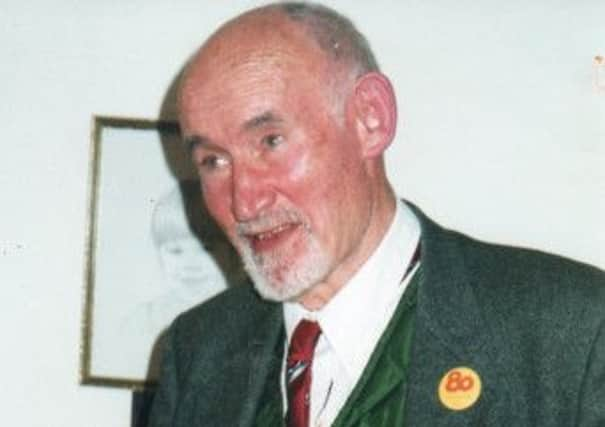Obituary: Arnold Klopper FRCOG, Professor of Reproductive Endocrinology


Arnoldus Ilardus Klopper was a potent combination of left-wing South African, internationally renowned scientist and human rights activist with a deep and abiding sense of social justice, honed amongst the poverty and prejudice of his homeland.
Through his father’s work as a police officer he had grown up witnessing the effects of deprivation and ill-health and, while studying medicine, went on to champion the rights of his fellow men and women as president of the National Union of South African Students, railing against the segregation and oppression of the black population.
Advertisement
Hide AdAdvertisement
Hide AdBut his radical views were at odds with the National Party and after they came to power in 1948 promoting apartheid, the young doctor emigrated to Britain.
His arrival coincided with the birth of the NHS and here he established a world-class reputation in reproductive endocrinology, making important advances in research on human fertility and working in London, Edinburgh and Aberdeen where he took up Sir Dugald Baird’s invitation to join the Medical Research Council Obstetric Medicine Unit he was establishing in the North-east.
He also chaired the Aberdeen branch of the Campaign for Nuclear Disarmament and lived overlooking the sea in the village of Newtonhill where he and his wife frequently played host to visiting South Africans and Ugandans, leading medical scientists and political activists from all over the world.
Born in South Africa, he was the only child of an Afrikaner policeman and his wife, who was of English parentage. Afrikaans was his first language and as a boy he accompanied his father on his beat in rural areas where he saw first-hand the poverty and illness endured by the local population which undoubtedly influenced his own path in life.
Educated at Brebner College in Bloemfontein, in 1943 he went on a scholarship to the University of Witwatersrand in Johannesburg where he studied medicine and also took a BSc course in biochemistry.
It was during his second year that, appalled by the exclusion of a black student, W Z Conco, from an anatomy class while white women were present, he organised a protest strike.
The incident followed hard on the heels of moves to restrict black students’ access to university facilities at the General Hospital.
Their instruction was to be confined to non-European hospitals but until such facilities could be provided they would continue to be allowed access – with the proviso that under no circumstances would they be permitted to come into contact with European patients or attend the post-mortem of a European body.
Advertisement
Hide AdAdvertisement
Hide AdSoon after that decision was made the furore involving Conco erupted when he was appointed as a student demonstrator in the anatomy department. The class included white women and 69 medical students signed a petition calling for his dismissal.
However, at Klopper’s instigation, the rest of the demonstrators backed Conco and threatened to resign. As a result of their defiance, the victimised student was officially appointed as a demonstrator, albeit to non-Europeans, and unofficially he was permitted to demonstrate to anyone who requested his help.
Conco went on to help found the African National Congress Youth League, with law student and future South African president Nelson Mandela, and graduated from medical school in 1947. Many years later, while being tried for treason, Dr Conco described the incident during his student days as the great radicalising experience in his life.
Meanwhile, Klopper, whose actions had some success in slowing the march of apartheid in the university, continued to support human rights and in 1945 was appointed president of the National Union of South African Students which he ran as a non-racial organisation.
He graduated in 1947 and spent his first two years as a resident in hospitals in the Johannesburg slums. By the late 1940s he had married Mary, a social scientist, and when the National Party was elected in 1948 it was in his interests, in view of his incompatible views and the number of arrests, to leave the country.
Klopper, who had also incurred the displeasure of the Labour Party when he stood as a socialist candidate against the local leader in the Johannesburg city elections, understood he had no future professionally in South Africa and joined the National Health Service in Britain. He had specialised in obstetrics and gynaecology and took up a post at the British Hospital for Mothers and Babies in south London.
He later moved to Edinburgh and in 1956 he joined Sir Dugald Baird’s unit in Aberdeen where he became one of the foremost reproductive endocrinologists of his time. He specialised in the foetal placental unit, discovering much about the role of oestrogens in human pregnancy, and was recognised for both his cutting-edge research and his forthright teaching. During the 1960s he spent some time in New York on a research fellowship at the Society of the New York Hospital and his wife worked with the New York-based left wing Monthly Review.
Back in Aberdeen Mary stood as a parliamentary Labour candidate for North Angus and Mearns in the 1964 general election, losing out to the Conservative Alick Buchanan-Smith and coming third after the Liberals. Her husband later resigned from the Labour party over New Labour policies.
Advertisement
Hide AdAdvertisement
Hide AdHe retired from Aberdeen University in 1987 but is still remembered annually with the award of a prize in his name to the student with greatest overall distinction in obstetrics and gynaecology. A man of deep convictions regarding the social and scientific basis of medicine, he was a strong advocate of the right of women to choose and dealt personally with the most difficult births.
Prof Klopper was widowed in 2005. He and his wife had no children.